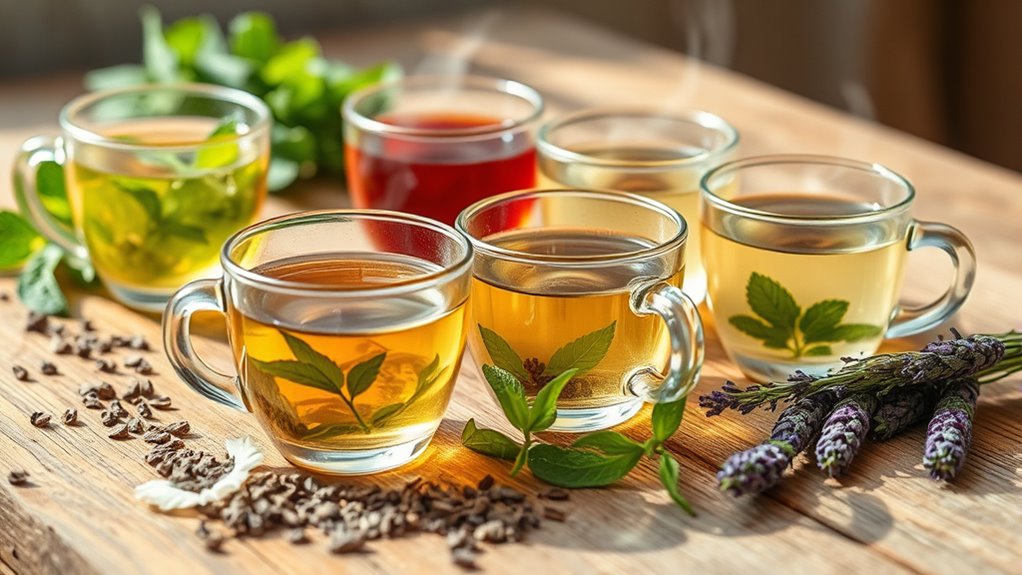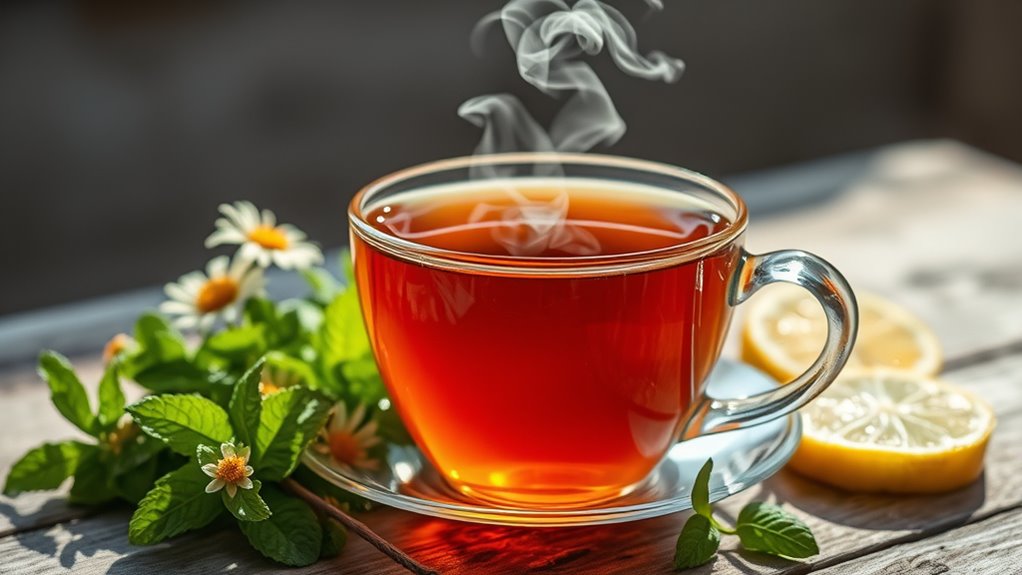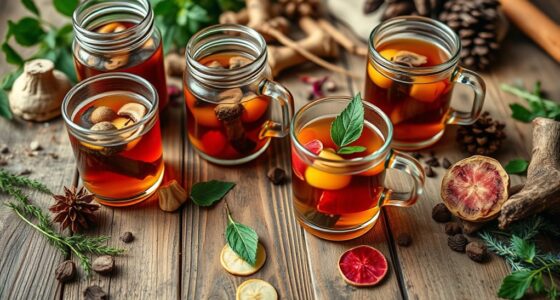Herbal teas offer a natural way to boost your health with antioxidants that fight free radicals and support your immune system. They’re calming, helping you relax and improve sleep, while also aiding digestion and reducing gastrointestinal discomfort. Plus, they’re caffeine-free and easy to include in your daily routine, making them perfect for any time of day. Keep exploring to discover how different herbal teas can enhance your overall well-being in simple, enjoyable ways.
Key Takeaways
- Rich in antioxidants that fight free radicals and support immune health.
- Promote relaxation and reduce stress, aiding mental well-being and sleep quality.
- Help soothe digestive issues like nausea, bloating, and gastrointestinal discomfort.
- Naturally caffeine-free options suitable for any time of day.
- Offer a variety of flavors and benefits, supporting overall wellness naturally.

Herbal teas have become a popular choice for those seeking natural remedies and relaxing beverages. You might reach for a warm cup of chamomile to unwind after a long day or sip on peppermint to refresh your senses. Unlike traditional teas made from Camellia sinensis, herbal teas are infusions of various herbs, flowers, and plants, offering a wide array of health benefits. You can enjoy these beverages not just for their soothing flavors but also for their potential to improve your overall well-being.
Herbal teas offer soothing flavors and numerous health benefits for your well-being.
When you drink herbal teas, you’re providing your body with natural antioxidants that help combat free radicals, which can cause cellular damage. For example, green and white teas contain catechins that support your immune system, while chamomile offers anti-inflammatory properties that may ease muscle tension and reduce discomfort. These antioxidants work within your body to promote healthier skin, boost your energy levels, and support your body’s defenses against illness. Additionally, research shows that the proper use of airless paint sprayers can help reduce exposure to fumes and paint particles, contributing to a healthier indoor environment.
Incorporating herbal teas into your daily routine can be a simple way to nurture your health without relying on supplements or medications.
Many herbal teas are known for their calming effects, making them excellent choices if you’re dealing with stress or trouble sleeping. For instance, sipping on a cup of valerian root or lavender tea can help relax your nervous system and improve the quality of your rest. When you make these teas part of your bedtime ritual, you’re not just enjoying a warm beverage; you’re actively supporting your mental health and emotional balance.
If you find yourself feeling anxious or overwhelmed, herbal teas like lemon balm or passionflower can provide a gentle, natural way to soothe your mind.
Herbal teas can also aid digestion and relieve gastrointestinal discomfort. Ginger tea, for example, has been used for centuries to combat nausea and improve digestion, while peppermint tea can reduce bloating and gas. When you include these teas in your diet, especially after meals, you may notice a decrease in digestive issues and an increase in comfort.
Their natural properties help to stimulate digestion and soothe your stomach, making them a smart choice for maintaining gastrointestinal health.
Finally, herbal teas are versatile and easy to incorporate into your lifestyle. Whether you prefer hot or iced, you can tailor your tea choices to your specific health needs and taste preferences. They’re naturally caffeine-free, which makes them suitable for any time of day, and their variety means you can enjoy different health benefits by switching up your selections.
Making herbal teas a regular part of your routine supports your efforts to live a healthier, more balanced life, all while savoring delicious flavors that bring comfort and calm to your day.
Frequently Asked Questions
Are Herbal Teas Safe During Pregnancy?
When you’re pregnant, it’s natural to wonder if herbal teas are safe. You should be cautious because some herbs can cause contractions or affect your baby’s development.
Always check with your healthcare provider before drinking herbal teas, especially those with ingredients like ginger, peppermint, or chamomile.
Stick to well-known, pregnancy-safe options and avoid teas with herbs that might be risky, ensuring both your safety and your baby’s well-being.
Can Herbal Teas Replace Medical Treatments?
Sure, herbal teas can seem like the miracle cure, but don’t ditch your doctor just yet. While they offer soothing comfort and some health perks, they aren’t replacements for medical treatments.
You wouldn’t trust a tea bag to fix a broken bone, right? Use herbal teas as a supportive boost, not a substitute.
Always consult your healthcare provider before making any big changes to your treatment plan.
How Do Herbal Teas Affect Medication?
You might wonder how herbal teas affect medication. They can interact in ways that either boost or reduce your medication’s effectiveness.
Some herbs, like St. John’s Wort, can interfere with antidepressants, while others may cause side effects or alter absorption.
It’s important to check with your healthcare provider before drinking herbal teas regularly, especially if you’re on medication, to avoid any unintended interactions.
Which Herbal Teas Are Best for Weight Loss?
You’re curious about which herbal teas support weight loss. Green tea is a top choice because it boosts metabolism and aids fat burning. Ginger tea can help curb appetite and improve digestion. Peppermint tea may reduce cravings.
Oolong tea combines benefits of green and black teas for weight management. Incorporate these teas into your routine, but remember, they work best with a balanced diet and regular exercise.
Are There Any Herbal Teas That Cause Allergies?
You mightn’t realize it, but some herbal teas can trigger allergies just like lightning strikes unexpectedly. Certain herbs like chamomile, ragweed, or peppermint are common culprits and can cause reactions ranging from mild irritation to severe allergic responses.
If you have sensitivities, it’s crucial to check ingredients carefully and start with small sips. Always consult your healthcare provider if you’re unsure, because allergic reactions are no joke.
Conclusion
So, next time you brew a cup of herbal tea, remember it’s more than just a soothing drink—it’s a timeless elixir for your health. Whether you’re seeking relaxation or a boost, these teas can be your trusty allies, much like a trusty sidekick in your quest for wellness. Don’t forget, in the grand tapestry of health, a simple sip might just be your secret weapon—just like the ancient herbalists of yore would tell you.









